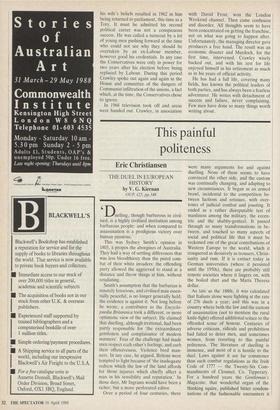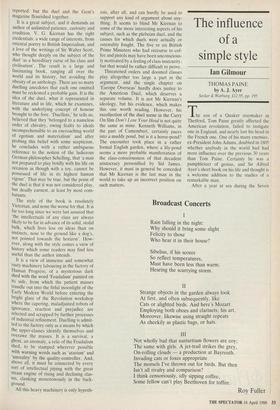This painful politeness
Eric Christiansen
THE DUEL IN EUROPEAN HISTORY
by V. G. Kiernan
OUP, f25, pp.348
Duelling, though barbarous in civil- ised, is a highly civilised institution among barbarous people: and when compared to assassination is a prodigious victory over human passions.'
This was Sydney Smith's opinion in 1803, a propos the aborgines of Australia. They had a way of settling differences that was less bloodthirsty than the pistol com- bat of their white invaders: the offending party allowed the aggrieved to stand at a distance and throw things at him, without retaliating.
Smith's assumption that the barbarian is innately ferocious, and civilised man essen- tially peaceful, is no longer generally held; the evidence is against it. Not long before he wrote,' a contributor to the Encyclo- paedia Britannica took a different, or more optimistic view of the subject. He claimed that duelling, although irrational, had been partly responsible for 'the extraordinary gentleness and complaisance of modern manners'. Fear of the challenge had made men respect each other's feelings, and curb their offensiveness. Violence bred man- ners. In any case, he argued, Britons were tempted to fight because of 'the inadequate redress which the law of the land affords for those injuries which chiefly affect a man in his sensibility and reputation.' In those days, Mr Ingram§ would have been a richer, but a more perforated editor.
Over a period of four centuries, there were many arguments for and against duelling. None of them seems to have convinced the other side, and the custom was continually changing, and adapting to new circumstances. It began as an armed brawl, incidental to the competition be- tween factions and retinues, with over- tones of judicial combat and jousting. It ended as a rather disreputable test of manliness among the military, the eccen- tric and the shabby-genteel. It passed through so many transformations in be- tween, and touched so many aspects of social and political life that it must be reckoned one of the great contributions of Western Europe to the world, which it conquered as decisively as trousers, Christ- ianity and rum. If it is extinct today in German universities (where it persisted until the 1950s), there are probably still remote societies where it lingers on, with the boiled shirt and the Maria Theresa dollar.
As late as the 1880s, it was calculated that Italians alone were fighting at the rate of 276 duels a year; and this was in a country where both the law and the custom of assassination (not to mention the rural knife-fight) offered additional solace to the offended sense of honour. Centuries of adverse criticism, ridicule and prohibition had failed to deter men, and sometimes women, from resorting to this painful politeness. The literature of duelling is immense, and most of it is hostile to the duel. Laws against it are far commoner than such combat regulations as the Irish Code of 1777 — the Twenty-Six Com- mandments of Clonmel, Co. Tipperary. For a hundred years the Gentleman's Magazine, that wonderful organ of the thinking squire, published bitter condem- nations of the fashionable encounters it
reported: but the duel and the Gent's magazine flourished together.
It is a great subject, and it demands an author of unlimited patience, curiosity and erudition. V. G. Kiernan has the right credentials: a wide range of interests, from oriental poetry to British Imperialism, and a love of the writings of Sir Walter Scott, who thought deeply on the subject of the duel `as a hereditary curse of his class and civilisation'. The result is a large and fascinating book, ranging all over the world and its history, but avoiding the obesity of an anthology. There are so many duelling anecdotes that each one omitted must be reckoned a probable gain. It is the idea of the duel, what it represented in literature and in life, which he examines, with the underlying concept of honour brought to the fore. 'Duellists,' he tells us, believed that they 'belonged to a nameless order of chivalry, owing fealty to ideals incomprehensible to an encroaching world of egotism and materialism' and after probing this belief with some scepticism, he concludes with a rather ambiguous reference to the notion of the ludicrous German philosopher Schelling, that 'a man not prepared to play boldly with his life on occasion as though with a toy, cannot be possessed of life in its highest human vigour'. That may be true, but the point of the duel is that it was not considered play, but deadly earnest, at least by most com- batants.
The style of the book is resolutely Victorian, and none the worse for that. It is far too long since we were last assured that `the intellectuals of any class are always likely to be far in advance of its solid, stolid bulk, which lives less on ideas than on instincts, nose to the ground like a dog's, not pointed towards the horizon'. How- ever, along with the style comes a view of history which some readers may find less useful than the author intends.
It is a view of immense and somewhat rusty machinery labouring in the factory of Human Progress; of a mysterious dark shed with the word 'Feudalism' painted on its side, from which the patient masses trundle out into the fitful moonlight of the Early Modern World before entering the bright glare of the Revolution workshop where the capering, maladjusted robots of ignorance, reaction and prejudice are selected and scrapped by further processes of industrial refinement. Duelling is admit- ted to the factory only as a means by which the upper-classes identify themselves and overawe the masses. It is a survival, a ghost, an anomaly, a relic of the Feudalism shed, to be stamped wherever possible with warning words such as 'atavism' and `unreality' by the quality-controller. And, above all, it must be connected by every sort of intellectual piping with the great steam engine of rising and declining clas- ses, clanking monotonously in the back- ground.
All this heavy machinery is only hypoth-
esis, after all, and can hardly be used to support any kind of argument about any- thing. It seems to blind Mr Kiernan to some of the more interesting aspects of his subject, such as the plebeian duel, and the causes for which duels were actually or ostensibly fought. The five or six British Prime Ministers who had recourse to cof- fee and pistols may have been unconscious- ly motivated by a feeling of class insecurity, but that would be rather difficult to prove.
Threatened orders and doomed classes play altogether too large a part in the argument, and the single chapter on `Europe Overseas' hardly does justice to the American Duel, which deserves a separate volume. It is not Mr Kiernan's ideology, but his evidence, which makes this one worth reading. However, his recollection of the duel scene in the Carry On film Don't Lose Your Head is not quite the same as mine. Kenneth Williams, in the part of Camembert, certainly paces into a muddy pond, but is it a horse-pond? The encounter took place in a rather formal English garden, where a lily-pond seems a more probable manifestation of the class-consciousness of that decadent aristocracy personified by Sid James. However, it must in general be conceded that Mr Kiernan is the last man in the world to take up an incorrect position on such matters.































































 Previous page
Previous page